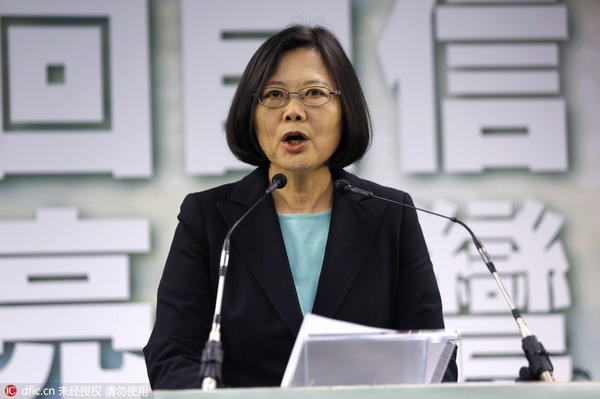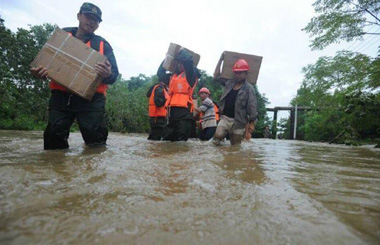Missile misfire makes trust building urgent
Updated: 2016-07-06 07:53
By Li Zhenguang(China Daily)
|
||||||||
 |
|
Taiwan's main opposition Democratic Progressive Party, DPP, Chairperson Tsai Ing-wen speaks during a press conference in Taipei, Taiwan, on April 15, 2015. [Photo/IC] |
Zhang Zhijun, the Chinese mainland's Taiwan affairs chief, has urged Taiwan officials to give a "responsible explanation" for the misfiring of a missile. The island's authorities confirmed on Friday afternoon that the navy had misfired a missile that morning, which hit a Taiwan fishing boat in the waters off the island, killing one person and injuring three people.
In response, Taiwan new leader Tsai Ing-wen has called for strict "military" discipline and promised a full explanation to the mainland and neighboring states. Also, the island's "military" issued a written report on Monday explaining the entire incident.
Speculations aside, the island's poor "defense" management and disorderly training program is to be blamed for the "failure of personnel to follow procedures during a test". On the one hand, many of the island's "defense" personnel, especially new recruits, are not adept at handling cutting-edge weapons like anti-ship missiles, with the misfiring of the missile being a case in point. On the other hand, the incident may have a lot to do with the low morale of and simmering discontent among the "defense" personnel.
The Taiwan "defense" sector has long fallen victim to populism. The recent public protest against some soldiers who had killed a stray dog, for example, prompted the offenders and a senior official to apologize twice, dealing another blow to the "defense" department's image.
The ruling Democratic Progressive Party, too, has challenged the authority and competence of the "defense" forces before-it did so even after DPP chairwoman Tsai assumed office in May.
True, there is no need to over-interpret the misfiring of the missile on Friday. But absurd as it may sound, similar incidents have taken place even earlier. Until now, mainland authorities have exercised restraint on such "accidents", which some observers say, was "created" to urge the mainland to restart the cross-Straits communication mechanism.
But the truth is, whether or not the misfiring of the missile conveys such a political urge, both sides can cooperate only on the political basis of the 1992 Consensus.
Indeed, the incident highlights the importance of timely communication between the mainland and Taiwan-it reportedly took the latter eight hours to report to the mainland Taiwan affairs office perhaps because of the temporary suspension of the hotline.
It is therefore important for Tsai and her DPP to make clear their stance on the 1992 Consensus and, hopefully, acknowledge it if they really want the resumption of communications. Otherwise, they have to take the blame for and have to deal with any untoward outcome in the absence of candid exchanges.
The author is a professor at the Institute of Taiwan Studies, Beijing Union University. The article is an excerpt from his interview with China Daily's Cui Shoufeng.
- Tricks won't earn Tsai overseas support
- Tsai stepping toward cross-Straits trouble
- Coping with Tsai's conjuring of 'de facto independence'
- Tsai shows no goodwill on cross-Straits ties: mainland scholar
- Tsai's only sensible option is to endorse Consensus
- Tsai's inaugural speech leaves crucial Straits questions unanswered
- Overseas media, experts voice worries over Tsai Ing-wen's equivocation
- Tsai's stance on one China 'incomplete'
- Tsai may jeopardize US policy
- Tsai must drop the fantasy of muddling through
- NASA's Juno spacecraft loops into orbit around Jupiter
- Independence Day parade held in Washington D.C.
- 'Star Wars stormtroopers' celebrate culture festival in Spain
- UKIP leader Farage announces surprise departure
- Explosion heard near US consulate general in Jeddah: media
- 43 killed in NW Pakistan flash flood

 Iceland soccer team gets hero's welcome back home
Iceland soccer team gets hero's welcome back home
 Power giant Hanergy shows its solar concept cars
Power giant Hanergy shows its solar concept cars
 Murray downs Kyrgios; Serena powers into quarters
Murray downs Kyrgios; Serena powers into quarters
 Nanjing's Linggu temple offers best view of fireflies
Nanjing's Linggu temple offers best view of fireflies
 In pics: Bikes in Beijing hutongs
In pics: Bikes in Beijing hutongs
 World in photos: June 27- July 3
World in photos: June 27- July 3
 Installation process of world's largest telescope in China
Installation process of world's largest telescope in China
 Dam's floodway blasted to discharge water in Hubei
Dam's floodway blasted to discharge water in Hubei
Most Viewed
Editor's Picks

|

|

|

|

|

|
Today's Top News
Abe's blame game reveals his policies failing to get results
Ending wildlife trafficking must be policy priority in Asia
Effects of supply-side reform take time to be seen
Chinese State Councilor Yang Jiechi to meet Kerry
Chinese stocks surge on back of MSCI rumors
Liang avoids jail in shooting death
China's finance minister addresses ratings downgrade
Duke alumni visit Chinese Embassy
US Weekly

|

|








